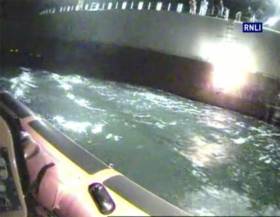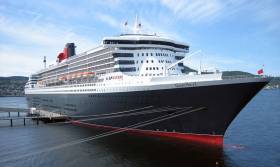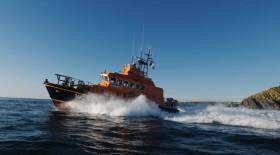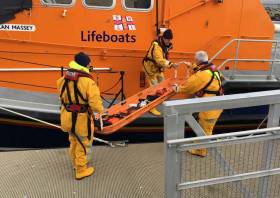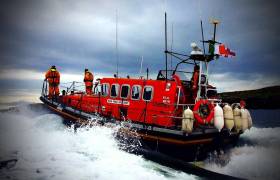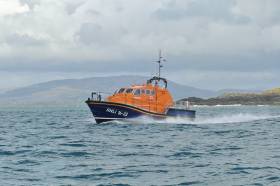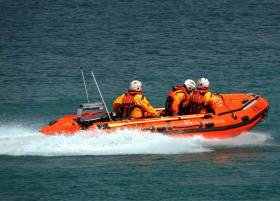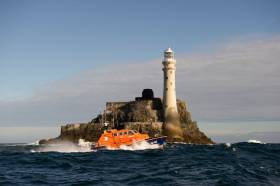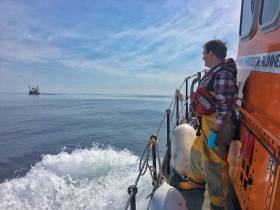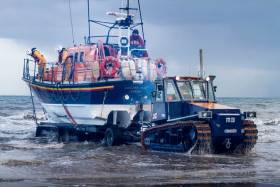Displaying items by tag: Medevac
Crosshaven Lifeboat In Early-Morning Medevac For Ill Trawlerman
#Lifeboats - The first callout of 2019 for the RNLI crew at Crosshaven was a medevac for a fisherman taken ill on a large fishing vessel in the early hours of Sunday 6 January.
Shortly after 5.30am volunteers from Crosshaven RNLI were paged and requested by the Irish Coast Guard to go the assistance of an ill crew member onboard a UK-registered supertrawler two miles south of Roches Point.
The inshore lifeboat, with Ian Venner in command and Derek Moynan, Caomhe Foster and Alan Venner onboard, were quickly under way and met with the ship at 6.10am.
Having assessed the situation, the lifeboat crew swiftly evacuated the ill man back to station in Crosshaven before handing him into the care of National Ambulance Service paramedics.
Speaking following the callout, Crosshaven RNLI lifeboat operations manager Patsy Fegan said: “We would like to wish the casualty a speedy recovery and thank our crew. Our hats are off to them.
“It’s a shock to the system to be awoken from a deep sleep by your pager and be on a lifeboat within 10 minutes but this is what our volunteers are willing and prepared for in order to help someone in need.”
Shore crew on Sunday morning were Gary Heslin, Molly Murphy, Jonathan Birmingham and James Fegan.
Medevac From Queen Mary 2 Off Irish Coast Is Second In 13 Months
The Clare Herald reports on a helicopter medevac from the Queen Mary 2 off the Irish coast earlier this week.
Rescue 115 from the Irish Coast Guard was involved in the evacuation of an elderly woman to University Hospital Limerick from the luxury ocean liner on Monday afternoon (19 November).
The incident came just over a year after an elderly man with a suspected heart problem was evacuated from the same liner off West Cork.
Ballycotton Lifeboat In Medevac From Ferry Off East Cork Coast
#RNLI - Ballycotton RNLI launched their all-weather lifeboat on Saturday evening (4 August) around 7.20pm to a crew member on board the Pont-Aven cruise ferry.
The female casualty, who became injured while working on the vessel, required a medevac while 30 miles off Ballycotton Bay.
Ballycotton RNLI and its volunteer crew were launched on request by Valentia Coast Guard and proceeded to the incident.
The Pont-Aven altered its course back towards Cork Harbour and was met by Ballycotton RNLI some 16 miles out. The casualty was transferred to Ballycotton’s all-weather lifeboat and brought to Crosshaven where the ambulance service was waiting to assist.
Weather conditions were favourable, and near perfect for the task which enabled all involved to transfer the casualty quickly and seamlessly.
Speaking following the callout, Ballycotton RNLI coxswain Eolan Walsh said: “The timeliness and transfer of the casualty was made so much simpler by the professionalism of the Pont-Aven’s fast rescue boat crew.
“We would like to thank all involved that contributed to a positive outcome and we wish the casualty a speedy recover from all at Ballycotton RNLI.”
Baltimore Lifeboat In Medevac From Cape Clear Island
#RNLI - Baltimore RNLI carried out a medical evacuation yesterday afternoon (Wednesday 25 July) from Cape Clear Island off the coast of West Cork.
The volunteer lifeboat crew launched their all-weather lifeboat following a request from the Irish Coast Guard at 1.42pm to provide medical assistance and evacuation to an islander living on Cape Clear.
Arrived in North Harbour at Cape Clear at 2.05pm, four of the volunteer crew went to the casualty’s location to assist with transfer and casualty care.
Once ready, the casualty was brought onboard Baltimore lifeboat and they departed the island at 3.07pm. The lifeboat returned to station in Baltimore and handed the casualty over to the care of HSE ambulance crew at 3.51pm.
Conditions at sea during the call out were relatively calm, with a south-westerly Force 3-4 wind and one-metre sea swell.
Speaking after the callout, Baltimore RNLI volunteer lifeboat press officer Kate Callanan said: ‘Medical evacuations — medevacs — are a regular service that Baltimore RNLI provide between the mainland and islands, and also between the mainland and private and commercial boats at sea.
“If you find yourself in need of medical assistance, call 999 or 112 and ask for the coastguard.”
There were six volunteer crew onboard the lifeboat: coxswain Aidan Bushe, mechanic Cathal Cottrell and crew members Eoin Ryan, Kieran Collins, Emma Lupton and Don O’Donovan.
#RNLI - Clifden RNLI’s all-weather lifeboat was launched on Tuesday evening (17 July) for the medevac of a young woman who sustained a serious head injury in a cycling accident on Inishbofin.
Arriving at the island’s harbour at 8.53pm, lifeboat crew members Joe Acton and Daniel Whelan met the island nurse, carried out an assessment and then transferred the casualty, a visitor to the island, on board.
The lifeboat proceeded to Cleggan where an ambulance was waiting to transfer the casualty to University College Hospital Galway. The crew continued to monitor her condition throughout the crossing.
“The casualty in this case was certainly in need of urgent medical treatment and we were glad to have been able to help to transfer her quickly to the mainland,” said Clifden RNLI coxswain James Mullen.
“The summer population of Inishbofin increases massively due to tourism and as a result these sorts of situations while rare can arise. The presence of the RNLI all-weather boat in the area has certainly helped for these kinds of incidents.”
Earlier in the week, the Clifden all weather boat had been launched to another medical emergency in the island but stood down after the coastguard helicopter reached the scene first.
Elsewhere on Tuesday evening, Skerries RNLI were tasked to a motorised RIB that had suffered electrical failure north of Lambay Island.
Shortly after 9pm the Atlantic 85 inshore lifeboat launched with Joe May at the helm and crewed by Sheila May, AJ Hughes and Jack Keane.
As the lifeboat neared the island, the casualty vessel fired a white parachute flare to alert of their whereabouts in fading light.
The vessel, with four men and one woman on board, was taken under tow by the lifeboat and returned to the safety of Rush Harbour.
“Thankfully we were able to locate the casualty quickly and all on board were well and in good spirits,” said Skerries RNLI volunteer lifeboat press officer Gerry Canning.
“Our volunteers are always ready to respond and we would always advise anyone going to sea to carry more than one means of contacting the shore, and, if needed, to make the call for help early.”
#RNLI - Baltimore RNLI carried out a medevac yesterday morning (Monday 21 May) from Cape Clear Island off the coast of West Cork.
The volunteer lifeboat crew were asked to launch their all-weather lifeboat following a request from the Irish Coast Guard at 7.53am to provide medical assistance and evacuation to a man living on the island.
The all-weather lifeboat arrived in Cape Clear at 8.25am and the casualty was transferred to the care of the volunteer crew onboard.
The lifeboat then returned to Baltimore lifeboat station at 8.55am and handed the casualty over to the care of HSE ambulance crew once they arrived at the station.
Conditions at sea during the shout were flat calm with a north-easterly Force 3 wind.
There were seven volunteer crew onboard the lifeboat: coxswain Aidan Bushe, mechanic Cathal Cottrell and crew members Brendan Cottrell, Micheal Cottrell, Jerry Smith, Emma Lupton and Don O’Donovan. Kieran Cotter provided shore crew assistance at the lifeboat house.
Speaking following the callout, Baltimore RNLI volunteer lifeboat press officer Kate Callanan said: “Baltimore lifeboat regularly provides medical assistance and transfers for people living, working or holidaying on the islands.
“This call is the third medical evacuation for Baltimore RNLI in the past two weeks.
“Always remember, if you find yourself at sea or on an island in need of medical assistance, call 999 or 112 and ask for the coastguard.”
RNLI Lifeboats In Medevac Shouts At Baltimore & Wicklow
#RNLI - Baltimore RNLI carried out a medevac on Saturday night (12 May) from Cape Clear Island off the coast of West Cork.
The volunteer crew were requested to launch their all-weather lifeboat by the Irish Coast Guard at 8.05pm to provide medical assistance and evacuation to a man working on the island.
Arriving in Cape Clear at 8.24pm, the RNLI volunteers transferred the casualty onto the lifeboat and returned him to Baltimore lifeboat station, whee he was handed over to the care of a waiting HSE ambulance crew.
Conditions at sea during the shout were calm with a south-westerly Force 3 wind and half-metre sea swell.
“So far this year medical evacuations make up a high percentage of the call outs for Baltimore lifeboat,” said Kate Callanan, Baltimore RNLI volunteer lifeboat press officer.
“Acting as an ambulance between the islands off the coast of West Cork is a vital service and our volunteer crews are trained to a high standard in first aid and casualty care.
“If you find yourself at sea or on an island in need of medical assistance, call 999 or 112 and ask for the coastguard.”
Hours later, Wicklow RNLI’s inshore lifeboat crew were alerted by pager shortly after 3.10pm yesterday afternoon (Sunday 13 May) to assist in the medic of an injured sailor in the town’s harbour.
The sailor was being treated on a yacht by first responders and HSC paramedics at the East pier after he sustained injuries while sailing in Wicklow Bay.
The lifeboat was requested to launch in case the casualty was seriously injured and needed to be evacuated from the yacht to a more suitable location for transfer to an ambulance.
The lifeboat, with helm Alan Goucher and crew Terry Sillery and Paul Sillery, was about to launch when lifeboat operations manager Des Davitt was made aware that the casualty was assisted up a ladder onto the pier after being treated by paramedics, and no further assistance was required.
#RNLI - Baltimore RNLI launched on Monday evening (7 May) to carry out a medical evacuation for a man from Sherkin Island off the West Cork coast.
The volunteer lifeboat crew arrived on scene at 7.40pm, just eight minute after launch, and provided casualty care before transferring the patient to the all-weather lifeboat and returning to Baltimore, where he was handed over to the HSE ambulance crew at 8.30pm.
Weather conditions were good at the time, with a south-westerly Force 2-3 wind and calm sea conditions within the harbour.
The volunteer crew onboard the lifeboat were coxswain Kieran Cotter, mechanic Cathal Cottrell and crew members Pat Collins, Aidan Bushe, Jerry Smith, Eoin Ryan, Don O’Donovan and Ronnie Carty.
Speaking following the callout, Baltimore RNLI volunteer lifeboat press officer Kate Callanan said: “The RNLI and other rescue agencies around the coast provide a vital service to those living or holidaying on islands. If you require assistance, please call 999 or 112 and ask for the coastguard.”
Dunmore East Lifeboat In Medevac 50 Miles Offshore
#RNLI - Dunmore East RNLI’s all-weather lifeboat launched on Saturday (21 April) to assist an injured crewman onboard a fishing trawler.
The crewman sustained an injury while fishing 70 miles offshore, and the trawler was intercepted by Dunmore East lifeboat 50 miles south of Dunmore East to conduct the medevac.
At 11:50am, the Trent Class lifeboat Windsor Runner launched with a transit time of two hours and 35 minutes to the scene, where it came alongside the trawler to transfer the casualty.
The injured crewman was administered first aid treatment and monitored by the lifeboat crew while routing back to Dunmore East Harbour, where he was handed over to the Ambulance Service at 4.45pm.
Dunmore East RNLI coxswain Michael Griffin said: “The sea conditions [on Saturday] were very good which helped in the transfer of the casualty to our lifeboat, our crew are highly trained in casualty care, and the injured man was very well looked after until he was handed over to the ambulance crew.”
Clogherhead Lifeboat Assists Medevac Of Injured Fisherman
#RNLI - Clogherhead RNLI assisted a fisherman in need of medical attention on Thursday evening (8 March).
The all-weather lifeboat was launched around 5.45pm following a request for a medevac from a small fishing boat operating off Gormanstown and north-east of Braymore Point in Balbriggan.
On arrival at the scene, members of the volunteer lifeboat crew boarded the fishing vessel to attend to the casualty and assess the situation.
The casualty, who had received a leg injury, was stabilised by the lifeboat crew and then carefully transferred by stretcher on to the lifeboat.
The Irish Coast Guard helicopter Rescue 116 from Dublin also attended the scene and was hovering close by. A paramedic from the helicopter crew provided further treatment before the casualty was winched aboard.
Speaking afterwards, Clogherhead RNLI coxswain Tomás Whelehan said: “We would like to wish the casualty a speedy recovery following his ordeal.
“This rescue demonstrated the value of our ongoing training and as lifeboat crew and also highlights the importance of joint working with our colleagues in the Irish Coast Guard.”



























